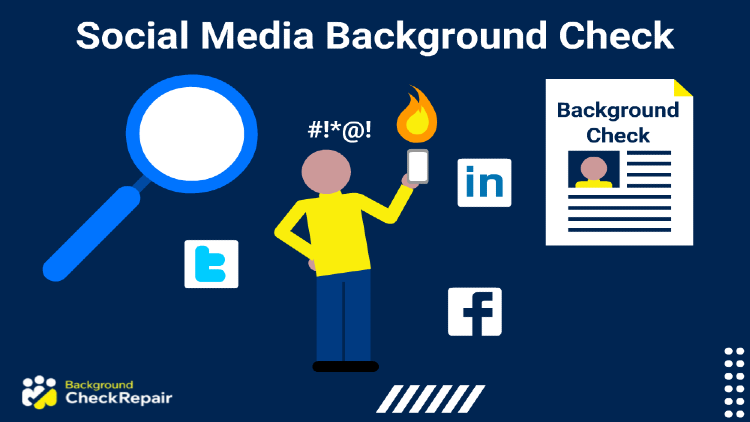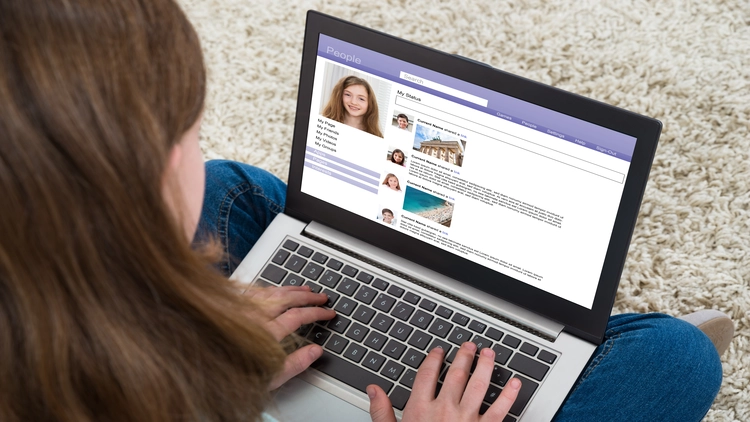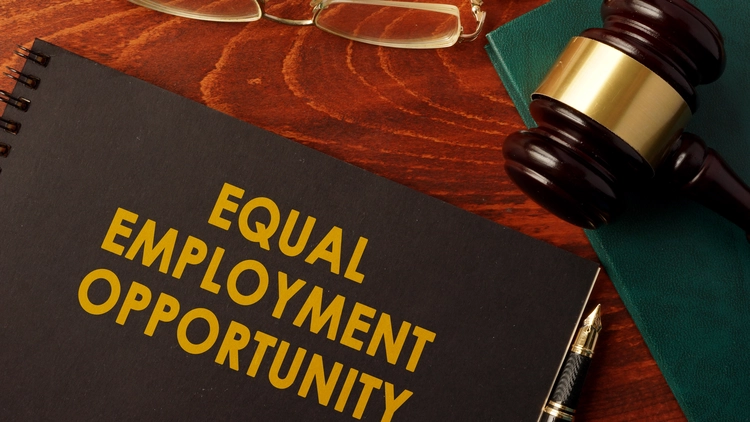We use cookies to ensure that we give you the best experience on our website. If you continue to use this site we will assume that you are happy with it
Full Social Media Background Check: Find Deleted Accounts, Old Posts
 Written by Background Check Repair
Written by Background Check Repair
Background Checks | June 10, 2024

Table of Contents
Whether it’s to run a background check on someone you just met or it’s an attempt to see what personal social media profiles reveal, running a social media background check may be a good idea for many different reasons.
As with running any kind of records check, there are likely many questions, such as is it legal? Can other people see deleted posts and accounts? What appears on a social media background investigation…and most of all, how is a social media background check done?
This guide provides all the information about running a full social media background screening.
What Is a Social Media Background Check for Employment?
When performing a social media check for personal reasons (like checking out someone who’s involved with your child, or investigating the character of a new church leader), permission isn’t required. However, when any sort of background check is run for professional reasons, the person being investigated must give consent. With a social media check, since the information is ‘public,’ this can often be overlooked. However, legal compliance should always be the number one concern for employers and others who are doing this background check for professional reasons, such as a nanny background screening or caregiver background screening.

Social media background checks are becoming more and more common these days for several reasons. Even individuals who have never had one run on themselves, are likely aware that they exist.
Although social media background checks are growing in frequency as part of pre-employment and full-scale background investigation processes, in general, there is nothing for the average person to worry about.
Why Are Social Media Background Checks Performed?
Typical background checks, such as checking criminal records and criminal histories, identity verification, and sex offender registry checks are self-explanatory, but the reason for a social media check may not be as obvious.
In general, the main reason that a company may perform social media checks as a condition of employment is the same reason they run criminal record history checks: To protect the company.
Just like checking for someone’s criminal history can give insight into the kind of liability issues that may arise with certain hires, looking into someone’s social media profiles will give at the very least a basic snapshot of the individual’s character and values.
Social media background checks are not necessarily performed to verify other information that was given by the applicant, such as education, but they can also ensure that the client isn’t likely to reflect poorly on the company as a whole. For example, there are hundreds of news stories about individuals who’ve made offensive remarks on social media. Just like a company hiring a registered sex offender, a business being associated with someone who makes potential customers feel uncomfortable can be cost-prohibitive.
How Are Social Media Background Checks Performed?
Many people wonder, how is a social media background check conducted?
There are a number of ways to examine social media on an individual, but they typically fall under two choices: Hiring a background check company that offers social media checks, or performing a DIY social media background check.
Agency Social Media Check
Most medium and large businesses will likely hire another company to perform the social media background check for them, similar to what is done for a typical background check. This entails the company using a variety of search tools and databases to view any social media profiles that exist that are connected to a certain individual. (This can be especially beneficial when investigating volunteers for non-profit organizations.)

They are able to achieve this by using the individual’s full name and location as well as some other basic information that is supplied by the employer from the individual’s application.
Many large companies also do these checks regularly or notify employees about social media monitoring.
However, a few states have begun to prohibit this practice, in relation to job retention. For example, Tennessee background screenings must now follow a social media law that prevents employers from reacting negatively to an employee’s private freedom of speech.
DIY Social Media Check
This process takes a little longer than contracting with an agency that uses scanning software. But, it can produce the same or even better results. A detailed method is outlined below.
What Shows Up on a Social Media Background Check?
The information that they are able to find may surprise many people. Forgotten social media accounts and even those that individuals thought were hidden may be found.
However, companies can still only view public information, so social media accounts that are private and only allow friends and followers to view the profile will still be hidden from view for the most part. However, even finding a private account can be useful to an employer who is checking the social security status and other aspects of a new hire.

Once the profiles have been identified, the employer will likely comb through them for anything that would reflect poorly on the company. Anything on the profile that does not align with company values will likely be addressed with the applicant and possibly result in the applicant being taken out of consideration for the job.
What disqualifies an applicant will vary widely based on the company. For example, many companies will not want employees to mention competitor brands on their social media profiles, whereas others will only be looking for major red flags such as offensive or illegal activity.
Social Media Background Check Pros and Cons
There are several pros and cons to running social media background checks for both the employer and the employee.
Pros
The most obvious benefit of a social media check for an employer is the ability to limit the risk of liability. Traditionally, a background check only shows official records for an individual, such as former convictions and education validation status. However, social media profiles provide insight into personal views.
Education information and past employment can also be revealed on social media. And although this is not the only way to verify this information, it is still a useful tool.
Companies can also use these checks to ensure the applicant’s values align with the business.
Cons
The cons of these background investigations include the potential invasion of privacy and violation of both state and federal Freedom of Speech laws.
One of the biggest cons for companies that are considering running a social media background check is that it is illegal in many jurisdictions.
State Law Violations
Many state laws prohibit employers from requesting social media profile information, such as Tennessee. This includes asking for usernames and passwords from applicants, asking the applicant to accept a friend or follower request, or requesting that the applicant change privacy information for their account.
The following states have laws regarding social media background checks carried out by employers:
- Arkansas
- California
- Colorado
- Connecticut
- Delaware
- Hawaii
- Illinois
- Louisiana
- Maine
- Maryland
- Michigan
- Montana
- Nebraska
- Nevada
- New Hampshire
- New Jersey
- New Mexico
- Oklahoma
- Oregon
- Rhode Island
- Tennessee
- Utah
- Vermont
- Virginia
- Washington
- West Virginia
- Wisconsin
The specific laws vary from state to state but in general, most refer to the practice of requesting social media information and forcing employees to give them access. Although performing these checks at all, is rarely specifically prohibited.
Illegal Discrimination
Another problem with performing a social media check is that it can lead to the discovery of information that the employer does not have a legal right to know about.

In most states, employers are not allowed to ask for certain personal information of their applicants and employees under any circumstances, in order to prevent discrimination. This includes race, gender, sexual orientation, religion, and political affiliation. This alone can cause massive potential legal issues, especially if the applicant is not hired as they could potentially claim discrimination due to race, gender identity, etc.
Wrong Profiles
Finally, another major problem with social media background checks is the possibility of finding the wrong profile. Even companies that are hired can make mistakes and find the social media profile of an individual with the same name.
This poses many obvious problems and once again opens the possibility of legal issues for the employer.
How To Do a Social Media Background Check on Yourself
Performing a social media background investigation on yourself is a worthwhile endeavor for many people, especially those who suspect that an employer may be checking on their social media, or those who want to check their profiles to ensure a potential employer will only see non-offensive content.
Step 1: Open a Private Browsing Window
Opening a private or incognito browsing window to perform the search will ensure that the information displayed is what a potential employer would see if they were to google the name.
It also filters out biased results or those location-based results.
Step 2: Google Your Name
The first and most basic check that can be performed is to simply search for your own name in the search engine. This will likely bring up social media profiles and any other mentions on the internet such as news articles.
Keep in mind that other individuals with the same name will also likely be part of the search.
Step 3: Check Existing Social Media Accounts
Now, perform a search on all active social media accounts. Individuals who only use Facebook or only use Twitter can limit their searches to just these websites. But, also use the previous search to click on all instances where the name being searched is mentioned.
This is a useful way to view what an employer can see on the profile, and what privacy settings are active.
Step 4: Check All Social Media Websites and Name Mentions
Even non-active social media accounts will show up on a social media background check. Click on every result that comes up with the name being searched. Many ‘reverse phone number’ sites and address lookup sites will likely be included, so searchers should also check “page 2” of the search results, clicking every site that includes the name.
Individuals who have not used their Twitter account for several years should still check what is available on the platform to ensure that the profile has not been updated by someone else.
On pages that are about other people, simply disregard those. However, examine all the information about yourself that you can find because an employer doing a social media background check will do the same.
Step 5: Narrow Search Results
Narrow down the search results by adding a city or other personal information alongside the name in a new Google search. This will enhance the results.
Even performing searches of a personal email address may turn up surprising results.
Step 6: Contact Websites Using Information Without Permission
Many people who run a thorough social media background check may be surprised to learn that certain personal information is on a website they have never accessed. Many background check sites contain public information but are legally forbidden to include it if a person has provided written instructions to remove their name. (Similar to placing a phone number on the ‘do not call’ list.)
The best plan in this situation is to search the site for “remove my profile” options, or similar removal tools. Then wait a few weeks and check the site again. Beyond this legal action may be necessary.
Step 7: Clean Up Social Media Profiles
Individuals who realize they have embarrassing posts or anything they would not want a potential employer to see should delete these posts.
This is especially important if a forgotten social media profile is found as part of the search. Some also choose to delete old accounts but be sure to follow the intricate steps involved with deleting a social media account.
Step 8: Change Privacy Settings
Finally, performing a social media background check on yourself may have revealed some gaps in the privacy settings of existing social media accounts.
Deleting the proper accounts and editing the privacy settings on accounts can help protect private information.
Is Social Media Screening and Monitoring Legal?
Social media screening and monitoring are legal under federal law in the United States. However, many states have adopted laws prohibiting certain social media background check practices.
Also, many social media background checks can enter the territory of potential discrimination, if the employer learns information that the employee wishes to keep private, such as sexual orientation or religion.
Companies That Do Social Media Background Checks
There are tons of companies that conduct social media background checks, some manually, but more often using software programs to search for specific words or phrases. This is especially common in industries such as tech, that have a large online presence.
Many companies that do social media screening may not do it for all positions, rather only ones that may deal more with the public such as social media managers.
Free Social Media Background Check Options
Besides the DIY option, many online background check companies will perform a social media background check for a small fee. Many of these websites will also offer a no-cost background check trial or heavily discounted options to perform searches.
With social media becoming so prevalent in today’s society, it’s no wonder employers have turned to social media profiles to learn more about applicants. Understanding the legality and process of a social media background check is important to avoid unwelcome consequences.
